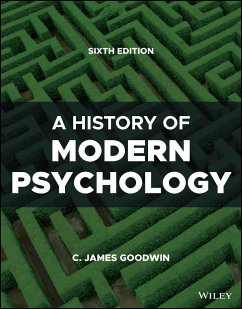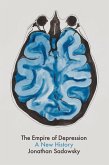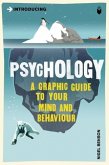C. James Goodwin
A History of Modern Psychology
C. James Goodwin
A History of Modern Psychology
- Broschiertes Buch
- Merkliste
- Auf die Merkliste
- Bewerten Bewerten
- Teilen
- Produkt teilen
- Produkterinnerung
- Produkterinnerung
A History of Modern Psychology provides a thorough account of the philosophical roots and recent history of psychology. Focusing on the ideas, concepts, and research contributions of pioneer psychologists who worked in the nineteenth and twentieth centuries, Dr. C. James Goodwin helps undergraduate students connect psychology's present with its rich past.
Now in its sixth edition, A History of Modern Psychology providesexpanded coverage of the history of the applied areas of psychology, philosophical and physiological antecedents, and significant advancements in the field in the twenty-first century.…mehr
Andere Kunden interessierten sich auch für
![The Wiley Handbook of Theoretical and Philosophical Psychology The Wiley Handbook of Theoretical and Philosophical Psychology]() The Wiley Handbook of Theoretical and Philosophical Psychology209,99 €
The Wiley Handbook of Theoretical and Philosophical Psychology209,99 €![The Empire of Depression The Empire of Depression]() Jonathan SadowskyThe Empire of Depression25,99 €
Jonathan SadowskyThe Empire of Depression25,99 €![Psychology in Social Context Psychology in Social Context]() Philip J. TysonPsychology in Social Context57,99 €
Philip J. TysonPsychology in Social Context57,99 €![Psychology in Social Context Psychology in Social Context]() Philip J. TysonPsychology in Social Context107,99 €
Philip J. TysonPsychology in Social Context107,99 €![Introducing Psychology Introducing Psychology]() Benson, Nigel, C.Introducing Psychology7,99 €
Benson, Nigel, C.Introducing Psychology7,99 €![Essentials of 16PF Assessment Essentials of 16PF Assessment]() Heather E P CattellEssentials of 16PF Assessment52,99 €
Heather E P CattellEssentials of 16PF Assessment52,99 €![How do different leadership styles influence the motivation and performance of employees? How do different leadership styles influence the motivation and performance of employees?]() AnonymousHow do different leadership styles influence the motivation and performance of employees?15,95 €
AnonymousHow do different leadership styles influence the motivation and performance of employees?15,95 €-
-
-
A History of Modern Psychology provides a thorough account of the philosophical roots and recent history of psychology. Focusing on the ideas, concepts, and research contributions of pioneer psychologists who worked in the nineteenth and twentieth centuries, Dr. C. James Goodwin helps undergraduate students connect psychology's present with its rich past.
Now in its sixth edition, A History of Modern Psychology providesexpanded coverage of the history of the applied areas of psychology, philosophical and physiological antecedents, and significant advancements in the field in the twenty-first century.
Hinweis: Dieser Artikel kann nur an eine deutsche Lieferadresse ausgeliefert werden.
Now in its sixth edition, A History of Modern Psychology providesexpanded coverage of the history of the applied areas of psychology, philosophical and physiological antecedents, and significant advancements in the field in the twenty-first century.
Hinweis: Dieser Artikel kann nur an eine deutsche Lieferadresse ausgeliefert werden.
Produktdetails
- Produktdetails
- Verlag: Wiley / Wiley & Sons
- Artikelnr. des Verlages: 1W119779260
- 6. Aufl.
- Seitenzahl: 528
- Erscheinungstermin: 27. September 2022
- Englisch
- Abmessung: 252mm x 202mm x 20mm
- Gewicht: 848g
- ISBN-13: 9781119779261
- ISBN-10: 111977926X
- Artikelnr.: 64361356
- Herstellerkennzeichnung
- Libri GmbH
- Europaallee 1
- 36244 Bad Hersfeld
- gpsr@libri.de
- Verlag: Wiley / Wiley & Sons
- Artikelnr. des Verlages: 1W119779260
- 6. Aufl.
- Seitenzahl: 528
- Erscheinungstermin: 27. September 2022
- Englisch
- Abmessung: 252mm x 202mm x 20mm
- Gewicht: 848g
- ISBN-13: 9781119779261
- ISBN-10: 111977926X
- Artikelnr.: 64361356
- Herstellerkennzeichnung
- Libri GmbH
- Europaallee 1
- 36244 Bad Hersfeld
- gpsr@libri.de
C. James Goodwin is Professor of Psychology at Western Carolina University and Emeritus Professor of Psychology at Wheeling Jesuit University, where he taught for 30 years. He is a Fellow of the American Psychological Association and the author of two undergraduate textbooks.
Preface xi
Acknowledgments xv
Chapter 1 Introducing Psychology's History 1
Why Take This Course? 2
Why Study History? 2
Why Study Psychology's History? 4
Key Issues in Psychology's History 6
Presentism versus Historicism 7
Internal versus External History 9
Personalistic versus Naturalistic History 10
Close-Up: Edwin G. Boring (1886-1968) 11
This Book's Point of View 14
Historiography: Doing and Writing History 14
Sources of Historical Data 15
From the Miles Papers: Miles Meets His Academic Grandfather 17
Problems with the Writing of History 18
Data Selection Problems 18
Interpretation Problems 20
Digital History 21
Approaching Historical Truth 22
Summary 23
Chapter 2 The Philosophical Context 25
A Long Past 26
René Descartes (1596-1650): The Beginnings of Modern Philosophy and Science 26
Descartes and the Rationalist Argument 28
The Cartesian System 29
Descartes on the Reflex and Mind-Body Interaction 30
The British Empiricist Argument and the Associationists 33
John Locke (1632-1704): The Origins of British Empiricism 33
Locke on Human Understanding 33
Locke on Education 35
George Berkeley (1685-1753): Applying Empiricism to Vision and Attacking Materialism 36
British Associationism 38
David Hume (1711-1776): The Rules of Association 38
David Hartley (1705-1757): A Physiological Associationism 40
Close-Up: Raising a Philosopher 42
John Stuart Mill (1806-1873): The Pinnacle of British Empiricism/Associationism 43
Mill's Psychology 44
Mill's Logic 45
Alexander Bain (1818-1903): On the Verge of Psychological Science 46
Rationalist Responses to British Empiricism/Associationism 48
Gottfried Wilhelm Leibniz (1646-1716) 48
Immanuel Kant (1724-1804) 49
In Perspective: Philosophical Foundations 50
Summary 51
Chapter 3 the Scientific Context 53
Heroic Science in the Age of Enlightenment 54
Functioning of the Nervous System 55
Reflex Action 56
The Bell-Magendie Law 58
The Specific Energies of Nerves 59
Helmholtz: The Physiologist's Physiologist 60
Measuring the Speed of Neural Impulses 62
Helmholtz on Vision and Audition 63
Helmholtz and the Problem of Perception 64
Localization of Brain Function 65
The Phrenology of Gall and Spurzheim 65
Close-Up: The Marketing of Phrenology 69
Flourens and the Method of Ablation 72
The Clinical Method 73
The Remarkable Phineas Gage 73
Broca and the Speech Center 74
Mapping the Brain: Electrical Stimulation 76
Nervous System Structure 77
Neuron Theory 78
Sir Charles Sherrington: The Synapse 79
From the Miles Papers: Miles Visits Sherrington in Oxford 81
In Perspective: The Nervous System and Behavior 81
Summary 82
Chapter 4 Wundt and German Psychology 84
An Education in Germany 85
On the Threshold of Experimental Psychology: Psychophysics 86
Johann Herbart (1776-1841) 87
Ernst Weber (1795-1878) 88
Two-Point Thresholds 88
Weber's Law 88
Gustav Fechner (1801-1889) 89
Fechner's Elements of Psychophysics 90
Wundt Establishes a New Psychology at Leipzig 91
Wilhelm Wundt (1832-1920): Creating a New
Acknowledgments xv
Chapter 1 Introducing Psychology's History 1
Why Take This Course? 2
Why Study History? 2
Why Study Psychology's History? 4
Key Issues in Psychology's History 6
Presentism versus Historicism 7
Internal versus External History 9
Personalistic versus Naturalistic History 10
Close-Up: Edwin G. Boring (1886-1968) 11
This Book's Point of View 14
Historiography: Doing and Writing History 14
Sources of Historical Data 15
From the Miles Papers: Miles Meets His Academic Grandfather 17
Problems with the Writing of History 18
Data Selection Problems 18
Interpretation Problems 20
Digital History 21
Approaching Historical Truth 22
Summary 23
Chapter 2 The Philosophical Context 25
A Long Past 26
René Descartes (1596-1650): The Beginnings of Modern Philosophy and Science 26
Descartes and the Rationalist Argument 28
The Cartesian System 29
Descartes on the Reflex and Mind-Body Interaction 30
The British Empiricist Argument and the Associationists 33
John Locke (1632-1704): The Origins of British Empiricism 33
Locke on Human Understanding 33
Locke on Education 35
George Berkeley (1685-1753): Applying Empiricism to Vision and Attacking Materialism 36
British Associationism 38
David Hume (1711-1776): The Rules of Association 38
David Hartley (1705-1757): A Physiological Associationism 40
Close-Up: Raising a Philosopher 42
John Stuart Mill (1806-1873): The Pinnacle of British Empiricism/Associationism 43
Mill's Psychology 44
Mill's Logic 45
Alexander Bain (1818-1903): On the Verge of Psychological Science 46
Rationalist Responses to British Empiricism/Associationism 48
Gottfried Wilhelm Leibniz (1646-1716) 48
Immanuel Kant (1724-1804) 49
In Perspective: Philosophical Foundations 50
Summary 51
Chapter 3 the Scientific Context 53
Heroic Science in the Age of Enlightenment 54
Functioning of the Nervous System 55
Reflex Action 56
The Bell-Magendie Law 58
The Specific Energies of Nerves 59
Helmholtz: The Physiologist's Physiologist 60
Measuring the Speed of Neural Impulses 62
Helmholtz on Vision and Audition 63
Helmholtz and the Problem of Perception 64
Localization of Brain Function 65
The Phrenology of Gall and Spurzheim 65
Close-Up: The Marketing of Phrenology 69
Flourens and the Method of Ablation 72
The Clinical Method 73
The Remarkable Phineas Gage 73
Broca and the Speech Center 74
Mapping the Brain: Electrical Stimulation 76
Nervous System Structure 77
Neuron Theory 78
Sir Charles Sherrington: The Synapse 79
From the Miles Papers: Miles Visits Sherrington in Oxford 81
In Perspective: The Nervous System and Behavior 81
Summary 82
Chapter 4 Wundt and German Psychology 84
An Education in Germany 85
On the Threshold of Experimental Psychology: Psychophysics 86
Johann Herbart (1776-1841) 87
Ernst Weber (1795-1878) 88
Two-Point Thresholds 88
Weber's Law 88
Gustav Fechner (1801-1889) 89
Fechner's Elements of Psychophysics 90
Wundt Establishes a New Psychology at Leipzig 91
Wilhelm Wundt (1832-1920): Creating a New
Preface xi
Acknowledgments xv
Chapter 1 Introducing Psychology's History 1
Why Take This Course? 2
Why Study History? 2
Why Study Psychology's History? 4
Key Issues in Psychology's History 6
Presentism versus Historicism 7
Internal versus External History 9
Personalistic versus Naturalistic History 10
Close-Up: Edwin G. Boring (1886-1968) 11
This Book's Point of View 14
Historiography: Doing and Writing History 14
Sources of Historical Data 15
From the Miles Papers: Miles Meets His Academic Grandfather 17
Problems with the Writing of History 18
Data Selection Problems 18
Interpretation Problems 20
Digital History 21
Approaching Historical Truth 22
Summary 23
Chapter 2 The Philosophical Context 25
A Long Past 26
René Descartes (1596-1650): The Beginnings of Modern Philosophy and Science 26
Descartes and the Rationalist Argument 28
The Cartesian System 29
Descartes on the Reflex and Mind-Body Interaction 30
The British Empiricist Argument and the Associationists 33
John Locke (1632-1704): The Origins of British Empiricism 33
Locke on Human Understanding 33
Locke on Education 35
George Berkeley (1685-1753): Applying Empiricism to Vision and Attacking Materialism 36
British Associationism 38
David Hume (1711-1776): The Rules of Association 38
David Hartley (1705-1757): A Physiological Associationism 40
Close-Up: Raising a Philosopher 42
John Stuart Mill (1806-1873): The Pinnacle of British Empiricism/Associationism 43
Mill's Psychology 44
Mill's Logic 45
Alexander Bain (1818-1903): On the Verge of Psychological Science 46
Rationalist Responses to British Empiricism/Associationism 48
Gottfried Wilhelm Leibniz (1646-1716) 48
Immanuel Kant (1724-1804) 49
In Perspective: Philosophical Foundations 50
Summary 51
Chapter 3 the Scientific Context 53
Heroic Science in the Age of Enlightenment 54
Functioning of the Nervous System 55
Reflex Action 56
The Bell-Magendie Law 58
The Specific Energies of Nerves 59
Helmholtz: The Physiologist's Physiologist 60
Measuring the Speed of Neural Impulses 62
Helmholtz on Vision and Audition 63
Helmholtz and the Problem of Perception 64
Localization of Brain Function 65
The Phrenology of Gall and Spurzheim 65
Close-Up: The Marketing of Phrenology 69
Flourens and the Method of Ablation 72
The Clinical Method 73
The Remarkable Phineas Gage 73
Broca and the Speech Center 74
Mapping the Brain: Electrical Stimulation 76
Nervous System Structure 77
Neuron Theory 78
Sir Charles Sherrington: The Synapse 79
From the Miles Papers: Miles Visits Sherrington in Oxford 81
In Perspective: The Nervous System and Behavior 81
Summary 82
Chapter 4 Wundt and German Psychology 84
An Education in Germany 85
On the Threshold of Experimental Psychology: Psychophysics 86
Johann Herbart (1776-1841) 87
Ernst Weber (1795-1878) 88
Two-Point Thresholds 88
Weber's Law 88
Gustav Fechner (1801-1889) 89
Fechner's Elements of Psychophysics 90
Wundt Establishes a New Psychology at Leipzig 91
Wilhelm Wundt (1832-1920): Creating a New
Acknowledgments xv
Chapter 1 Introducing Psychology's History 1
Why Take This Course? 2
Why Study History? 2
Why Study Psychology's History? 4
Key Issues in Psychology's History 6
Presentism versus Historicism 7
Internal versus External History 9
Personalistic versus Naturalistic History 10
Close-Up: Edwin G. Boring (1886-1968) 11
This Book's Point of View 14
Historiography: Doing and Writing History 14
Sources of Historical Data 15
From the Miles Papers: Miles Meets His Academic Grandfather 17
Problems with the Writing of History 18
Data Selection Problems 18
Interpretation Problems 20
Digital History 21
Approaching Historical Truth 22
Summary 23
Chapter 2 The Philosophical Context 25
A Long Past 26
René Descartes (1596-1650): The Beginnings of Modern Philosophy and Science 26
Descartes and the Rationalist Argument 28
The Cartesian System 29
Descartes on the Reflex and Mind-Body Interaction 30
The British Empiricist Argument and the Associationists 33
John Locke (1632-1704): The Origins of British Empiricism 33
Locke on Human Understanding 33
Locke on Education 35
George Berkeley (1685-1753): Applying Empiricism to Vision and Attacking Materialism 36
British Associationism 38
David Hume (1711-1776): The Rules of Association 38
David Hartley (1705-1757): A Physiological Associationism 40
Close-Up: Raising a Philosopher 42
John Stuart Mill (1806-1873): The Pinnacle of British Empiricism/Associationism 43
Mill's Psychology 44
Mill's Logic 45
Alexander Bain (1818-1903): On the Verge of Psychological Science 46
Rationalist Responses to British Empiricism/Associationism 48
Gottfried Wilhelm Leibniz (1646-1716) 48
Immanuel Kant (1724-1804) 49
In Perspective: Philosophical Foundations 50
Summary 51
Chapter 3 the Scientific Context 53
Heroic Science in the Age of Enlightenment 54
Functioning of the Nervous System 55
Reflex Action 56
The Bell-Magendie Law 58
The Specific Energies of Nerves 59
Helmholtz: The Physiologist's Physiologist 60
Measuring the Speed of Neural Impulses 62
Helmholtz on Vision and Audition 63
Helmholtz and the Problem of Perception 64
Localization of Brain Function 65
The Phrenology of Gall and Spurzheim 65
Close-Up: The Marketing of Phrenology 69
Flourens and the Method of Ablation 72
The Clinical Method 73
The Remarkable Phineas Gage 73
Broca and the Speech Center 74
Mapping the Brain: Electrical Stimulation 76
Nervous System Structure 77
Neuron Theory 78
Sir Charles Sherrington: The Synapse 79
From the Miles Papers: Miles Visits Sherrington in Oxford 81
In Perspective: The Nervous System and Behavior 81
Summary 82
Chapter 4 Wundt and German Psychology 84
An Education in Germany 85
On the Threshold of Experimental Psychology: Psychophysics 86
Johann Herbart (1776-1841) 87
Ernst Weber (1795-1878) 88
Two-Point Thresholds 88
Weber's Law 88
Gustav Fechner (1801-1889) 89
Fechner's Elements of Psychophysics 90
Wundt Establishes a New Psychology at Leipzig 91
Wilhelm Wundt (1832-1920): Creating a New








